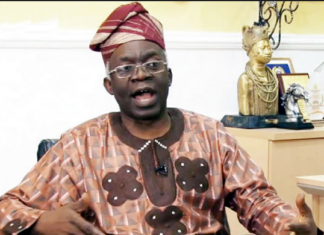Nigeria’s tribal warlords are agitating for recognition. But their war drums sound more attention-seeking than real.
Apart from the insurgency in the North East, the socio-political agitations are more minatory in the South West and South East. But that does not mean the resource control militancy in the South South is over yet.
It would be a mistake to label them as seeking to discomfit the government led by a Northerner or that they want to get its attention – a reminder that they are relevant.
Whatever the cause, their nuisance value is always sufficient to distract all from serious governance; consequently, it is necessary to give them the attention they covet. Every Nigerian originates from a tribe.
The crude oil boom, the country’s mainstay, is over.
World Bank’s forecast for oil price for the rest of this year is a high of $52 per barrel. If Iran pours some 0.5 million to 0.7 million on the international market from January next year or sooner, price variations will become unpredictably lower.
As Nigeria’s economy shrinks further and tilts towards recession next year and the huge population struggles not to bake a bigger national cake but to get a bigger share of the current small cake, more of such ill-wind of tribal agitations will blow across the landscape.
So, the new government of President Muhammadu Buhari ought to move fast, prod the South East states and local governments to create gainful employment for youths before the political devils do.
No government can afford to ignore the agitation of any significant number of its population about any problem, no matter how trivial.
For instance, on October 8, 2015, some Yoruba leaders met in Ibadan to reignite the age-old secession threat. The meeting, chaired by former Western Region Governor, Adeyinka Adebayo, had grievances about the invasion of their farmlands by Fulani herdsmen with unprovoked attacks and killings.
Two weeks later, the pro-Biafra secession movement of the South East got more adherents overnight. Until now, it was championed by the small Movement for the Sovereign State of Biafra (MASSOB).
Suddenly, protesters in the South South states of Rivers and Delta took to the streets in Port Harcourt and Asaba.
They were demonstrating in support of the pirate Radio Biafra director, Nnamdi Kanu, under an association of Indigenous People of Biafra (IPOB).
They demanded the unconditional release of Kanu, who was arrested in Lagos four days earlier for illegal broadcasts and flown to Abuja, where he was arraigned before a Magistrate’s Court.
Whether the spontaneity of the protests signposts rebels in search of a cause or a mouth-piece is uncertain.
What is certain is that the subterranean agitations and mutual suspicions among ethnic groups whispered in the privacy of family sitting rooms have spilled over into the public domain.
The government has to pay attention to resolving their grievances, not by the usual police arrests, harassment, and charging them for treasonable felony – which only harden them – but by a more systematic solution based on good governance principles and practice.
Some argue that the street protests were a reaction to bad governance legacy left by the administration of former President Goodluck Jonathan.
In the South East, where the Biafra movement is predominant, there are hardly any worthwhile paying jobs and good schools for the young ones; thus the underlying disenchantment against the system.
Good governance is the starting point. Rehabilitation of the region’s dilapidated infrastructure will provide construction industry jobs.
This is a problem which the federal government, their National Assembly lawmakers and the five state governments must jointly tackle.
Too many government leaders pay hypocritical lip service to devolution of power and resources from the centre to the periphery with fiscal and physical federalism.
A way out of the quagmire of secession propagandists is to put the youths into good schools and on passing out, get them engaged productively. Good recreational facilities for competitive sports will be welcomed indeed.
Forty-five years after the civil war, some of the youth are still intoxicated on the agitation propaganda of the unfulfilled 3Rs of reconciliation, reconstruction, and rehabilitation which the federal government said was necessary to fully reintegrate the South East into Nigeria’s socio-economic and political matrix.
Socio-political agitations do not do the country any good, be they peaceful, disruptive or violent. So also do they not do the agitators any good.
The secessionist war has come and gone. There was no victor, no vanquished at its bloody end with a costly two million lives lost on both sides which affected all families.
True federalism, over which leaders have dragged their feet for 45 years since the war, remains the best solution to the unnecessary confrontations and threats of secession any time tribal leaders feel aggrieved about even the most mundane and trivial problems with the federal government.













